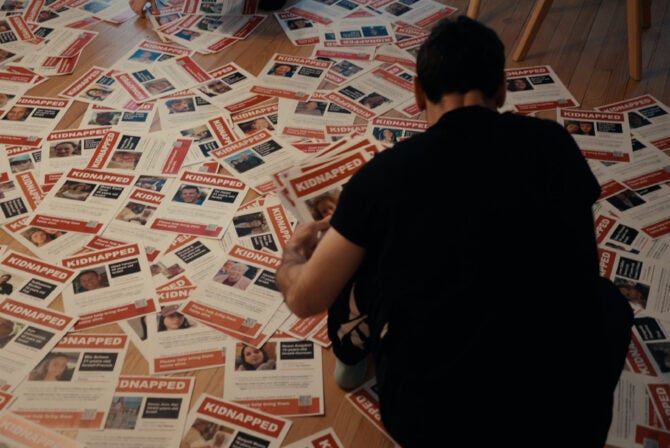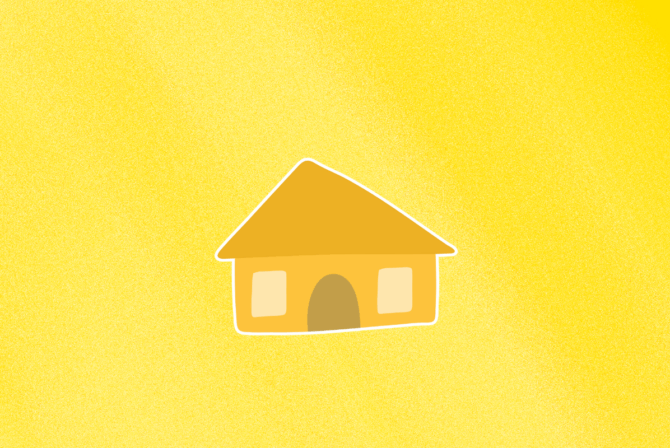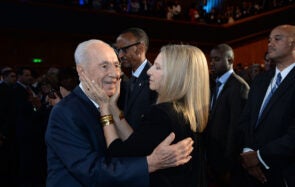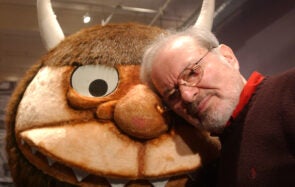I grew up in New York speaking Hebrew with my Israeli mother and at my day school, Spanish with my Argentinean father and grandparents, and English everywhere else. I enjoyed being able to talk to lots of people, but it wasn’t until I became a developmental psychologist that I fully understood what a wonderful gift my parents had given me.
Bilingualism has tremendous benefits, and not just when you are trying to find a bathroom in Tel-Aviv. Bilingual children are better at problem solving, planning, and self-control. A lifetime of bilingualism may even help delay the onset of dementia in old age.
I’ve always intended to give my child the gift of a second language that my parents gave me. However, it’s very difficult for one parent to teach his or her child more than one native language and the closest my husband comes to speaking a second language is his southern accent, so when I got pregnant I had to decide: would I teach my baby Hebrew or Spanish? Spanish is undoubtedly the more “useful” language with hundreds of millions of speakers worldwide, and finding Spanish learning resources for my son would be relatively easy. But I chose Hebrew because my son will have plenty of opportunities to learn Spanish later on, and, more importantly, because speaking Hebrew will give my son a lifelong connection to Israel, his family, and culture.
As I began my journey, I learned about research showing that children need to be exposed to a second language for at least 20% of their waking hours in order to become truly fluent (less than that and the child might learn some words or phrases but they probably won’t put together new sentences). So, if my son is awake for 10 hours per day, two of those hours should be spent listening to and speaking Hebrew. I admit this sounded daunting at first. Without Hebrew-speaking relatives or friends nearby, nor Jewish day schools in the Midwestern town where we live, how have I done this?
1. I made sure that my husband understood what I was doing and fully supported me. I work full-time so achieving two hours+ of Hebrew each day means that my son and I have to spend some time speaking Hebrew when his father is around. For example, when we sit down to dinner, I talk to my son in Hebrew while his father talks to him in English. This might sound like it would be really disruptive to family conversations, but it rarely is because, quite frankly, it’s pretty obvious what you are saying to your 2-year-old as he dumps his peas on the floor. Bonus: my husband has learned useful Hebrew phrases like “stop that!”
2. I started speaking Hebrew to my son the day he was born. Yes, talking to your newborn out loud about the weather, cars on the road, etc. can feel silly, and, yes, your baby might not be very interested in what you’re saying, but starting right away is the best way to make it a habit.
3. I try to only read to my son in Hebrew. We’re lucky to have Israeli relatives who send us books (you can also order Hebrew children’s books on Amazon and other sites), but even then the selection can get a little repetitive. That’s when I read my son’s English books in Hebrew. This can get a little tricky and sometimes I have to draw the line (Dr. Seuss is a nightmare to translate) but it usually works out.
4. Although non-live exposure is not the most effective way for children to learn language, my son watches Israeli children’s shows when he is with his dad or babysitters. YouTube is full of clips from Israeli children’s TV and even full-length episodes of classic Israeli children’s shows like Parpar Nechmad. Hint: to find these, set your smartphone to Hebrew and search for a show or song you know by typing its name in Hebrew, then look at the suggested links.
5. I use technology. My iPhone apps include Israeli children’s stories, Hebrew word and letter games, and a Hebrew-English dictionary. I also use my phone to jot down words that I need to look up and, once I do, to keep a short list of new Hebrew words that I am likely to forget five minutes later but want my son to learn. (Recent additions include: oboe, spiderweb, and rake.) The best thing about teaching your child a new word in a foreign language is that he will remind you of it later when you have forgotten it.
6. I don’t sweat the small stuff. My Hebrew is far from perfect. I regularly make pronunciation and grammatical mistakes. When I am talking to my son and I don’t know a word, I say it in English, but keep the rest of the sentence in Hebrew (and look up the correct word later). Then I remind myself that the important thing is not that my son speak perfect Hebrew, but that he speak it at all.
Making sure my son hears and speaks Hebrew takes effort. Sometimes I find myself defaulting to English when I’m tired or under pressure, and sometimes my son insists he wants me to read Curious George “b’anglit“( in English). But, far more often, I see my son’s face light up when he hears his favorite Hebrew songs and I listen to him talking to his Israeli grandmother in Hebrew–and I am thankful once again for the gift that we have both been given.
For more on raising bilingual children, read why one mother wants her kids to learn Russian, why another mom is glad her son is finally learning Hebrew, and how another mom screwed up the whole bilingual thing.







